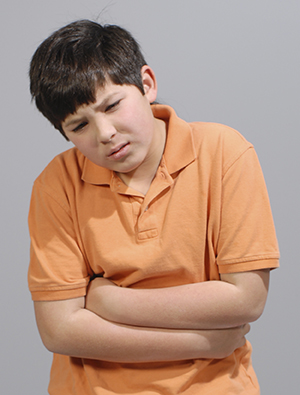When Your Child Has Cyclic Vomiting Syndrome (CVS)
When Your Child Has Cyclic Vomiting Syndrome (CVS)
Your child is having vomiting or retching (gagging) that goes on for hours, or even days. During this time, your child may also have headaches or stomach pain. Then it goes away for weeks or months at a time. Your child may have a rare problem called cyclic vomiting syndrome (CVS). CVS is sometimes known as abdominal migraine.
What causes CVS?
No one knows for sure what causes CVS. It’s likely related to migraine headaches, with similar triggers (things that set off an episode of CVS). Sometimes, if a family member suffers migraines, children might be more likely to have CVS. It can affect children of any age. It often first shows up in children from ages 3 to 7.
What can trigger a CVS episode?
Different things can trigger an episode. The most common triggers include:
Stress or excitement (such as holidays, school events, or vacations)
Viral infections (such as colds)
Allergies or sinus problems
Foods (such as chocolate or cheese)
Motion sickness
Menses
The 4 phases of CVS
CVS happens in 4 phases or stages:
Prodrome phase. This phase signals that an episode is about to begin. Symptoms include: aura (odd sensations), sensitivity to light, stomach pain, headache, or nausea. The prodrome phase can come on in minutes, or it can come on over a few hours. An episode can sometimes be stopped during this phase with medicine.
Episode phase. During this phase, your child has vomiting, retching, and nausea. It can last for many hours or even days. Your child may not be able to take any food or medicines by mouth.
Recovery phase. This phase begins when vomiting or retching stops. Your child is likely exhausted. She or he may fall asleep right away. It is common for children to wake up with muscle pain from the vomiting.
Symptom-free phase. The symptom-free phase is the time when your child feels fine. It may last weeks or months before another episode begins.
How is CVS diagnosed?
To diagnose CVS, the healthcare provider must first rule out other problems. The healthcare provider will likely ask about your child’s health history. This can help show the cycle of symptoms that point toward CVS. Tests may also be done, including blood tests to rule out other causes of vomiting. Radiology tests, such as an upper GI series, may also be ordered. This test can show the healthcare provider if there is a problem with your child's digestive system
How is CVS treated?
There is no cure for CVS. But you and your child can learn ways to try to prevent episodes. You can also learn how to stop an episode as it starts (see Preventing Future Episodes). Once severe vomiting begins, though, your child will likely need to go to the hospital right away. At the hospital, your child will receive medicines to try to stop the vomiting. Your child will likely need fluids to stay hydrated. This is usually done using an intravenous (IV) line. If needed, nutrition can also be given to your child through the IV line. Your child will likely stay in the hospital until the episode stops. There, your child can also receive care during the recovery phase.
Preventing future episodes
CVS episodes can be stressful and scary for you and for your child. It might help to know that you can act to prevent or manage episodes. Start by learning your child’s triggers. If your child is exposed to a trigger, or has prodrome symptoms, take action as directed by the healthcare provider. This can help stop the episode before it even starts. Sometimes, an episode can’t be prevented or stopped at home. When this happens, your child will need to be admitted to the hospital or emergency room. There, your child will receive needed treatment, hydration (fluids), and observation. If your child has episodes often, longer term medicines may be effective at decreasing the frequency and severity of attacks.
Long-term concerns
The good news is that children can outgrow CVS. This often happens in their teens. However, they may be more likely to have migraine headaches as adults. Your child may also be at higher risk for anxiety. For now, you should pay careful attention to your child’s teeth. Repeated vomiting can destroy tooth enamel due to the strong acids in your child’s stomach. This can lead to tooth decay. To help prevent tooth decay:
Have your child rinse the mouth often with water during episodes.
Make sure your child sees a dentist at least twice a year.
Updated:
January 19, 2018
Sources:
Anxiety Measures Predict Health-Related Quality of Life in Children and Adolescents with Cyclic Vomiting Syndrome. Tarbell S. The Journal of Pediatrics. 2015;167(3):633-38., Cyclic Vomiting Syndrome and Abdominal Migraine in Adults and Children. Evan R. Headache. 2013:53:984-93., Cyclic vomiting syndrome. UpToDate
Reviewed By:
Freeborn, Donna, PhD, CNM, FNP,Lehrer, Jenifer, MD
